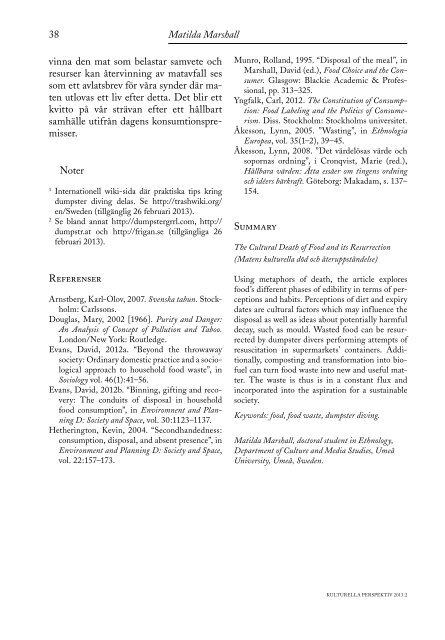149676_kulturell-perspektiv-nr-2-13
149676_kulturell-perspektiv-nr-2-13
149676_kulturell-perspektiv-nr-2-13
You also want an ePaper? Increase the reach of your titles
YUMPU automatically turns print PDFs into web optimized ePapers that Google loves.
38 Matilda Marshall<br />
vinna den mat som belastar samvete och<br />
resurser kan återvinning av matavfall ses<br />
som ett avlatsbrev för våra synder där maten<br />
utlovas ett liv efter detta. Det blir ett<br />
kvitto på vår strävan efter ett hållbart<br />
samhälle utifrån dagens konsumtionspremisser.<br />
Noter<br />
1<br />
Internationell wiki-sida där praktiska tips kring<br />
dumpster diving delas. Se http://trashwiki.org/<br />
en/Sweden (tillgänglig 26 februari 20<strong>13</strong>).<br />
2<br />
Se bland annat http://dumpstergrrl.com, http://<br />
dumpstr.at och http://frigan.se (tillgängliga 26<br />
februari 20<strong>13</strong>).<br />
Referenser<br />
Arnstberg, Karl-Olov, 2007. Svenska tabun. Stockholm:<br />
Carlssons.<br />
Douglas, Mary, 2002 [1966]. Purity and Danger:<br />
An Analysis of Concept of Pollution and Taboo.<br />
London/New York: Routledge.<br />
Evans, David, 2012a. “Beyond the throwaway<br />
society: Ordinary domestic practice and a sociological<br />
approach to household food waste”, in<br />
Sociology vol. 46(1):41–56.<br />
Evans, David, 2012b. “Binning, gifting and recovery:<br />
The conduits of disposal in household<br />
food consumption”, in Enviromnent and Planning<br />
D: Society and Space, vol. 30:1123–1<strong>13</strong>7.<br />
Hetherington, Kevin, 2004. “Secondhandedness:<br />
consumption, disposal, and absent presence”, in<br />
Environment and Planning D: Society and Space,<br />
vol. 22:157–173.<br />
Mu<strong>nr</strong>o, Rolland, 1995. “Disposal of the meal”, in<br />
Marshall, David (ed.), Food Choice and the Consumer.<br />
Glasgow: Blackie Academic & Professional,<br />
pp. 3<strong>13</strong>–325.<br />
Yngfalk, Carl, 2012. The Constitution of Consumption:<br />
Food Labeling and the Politics of Consumerism.<br />
Diss. Stockholm: Stockholms universitet.<br />
Åkesson, Lynn, 2005. ”Wasting”, in Ethnologia<br />
Europea, vol. 35(1–2), 39–45.<br />
Åkesson, Lynn, 2008. ”Det värdelösas värde och<br />
sopornas ordning”, i Cronqvist, Marie (red.),<br />
Hållbara värden: Åtta essäer om tingens ordning<br />
och idéers bärkraft. Göteborg: Makadam, s. <strong>13</strong>7–<br />
154.<br />
Summary<br />
The Cultural Death of Food and its Resurrection<br />
(Matens <strong>kulturell</strong>a död och återuppståndelse)<br />
Using metaphors of death, the article explores<br />
food’s different phases of edibility in terms of perceptions<br />
and habits. Perceptions of dirt and expiry<br />
dates are cultural factors which may influence the<br />
disposal as well as ideas about potentially harmful<br />
decay, such as mould. Wasted food can be resurrected<br />
by dumpster divers performing attempts of<br />
resuscitation in supermarkets’ containers. Additionally,<br />
composting and transformation into biofuel<br />
can turn food waste into new and useful matter.<br />
The waste is thus is in a constant flux and<br />
incorporated into the aspiration for a sustainable<br />
society.<br />
Keywords: food, food waste, dumpster diving.<br />
Matilda Marshall, doctoral student in Ethnology,<br />
Department of Culture and Media Studies, Umeå<br />
University, Umeå, Sweden.<br />
KULTURELLA PERSPEKTIV 20<strong>13</strong>:2


